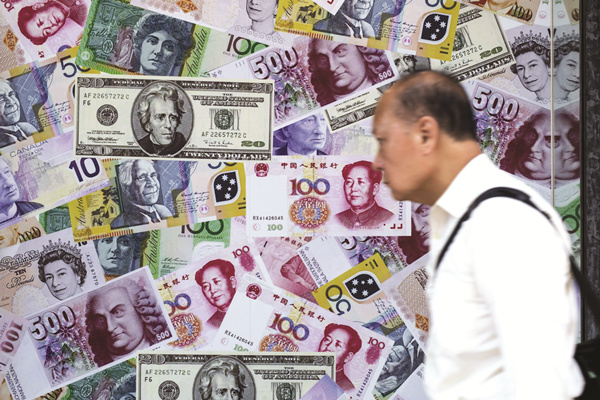Rising yuan use may lift IMF basket prospects
Updated: 2015-10-07 10:49
By Paul Welitzkin in New York(China Daily)
|
||||||||
|
 A man walks past an advertisement promoting foreign exchange services in Hong Kong last August. Tyrone Siu / Reuters |
The yuan's displacement of the Japanese yen as the world's fourth most-used currency is likely to bolster the Chinese currency's admission to the International Monetary Fund's (IMF) Special Drawing Rights basket of currencies, analysts said.
On Tuesday, transaction services provider Swift reported the yuan's new usage ranking.
William T. Wilson, a senior research fellow at The Heritage Foundation in Washington, noted several reasons for the greater use of the yuan: In 2013 China replaced the US as the world's largest trading nation. The yuan, also called the renminbi or RMB, has appreciated in real terms against most currencies the past decade to make it a desirable currency because of its preservation of store of value. And with China now the largest trading partner with 75 nations (many of them in Asia), it is quickly becoming a regional reserve currency.
"These factors all increase the probability the RMB will be included in the IMF (basket) sometime soon - perhaps a year from now. That said, until China removes its restrictions on capital controls, it will never challenge the US dollar as the world's dominant reserve currency," Wilson said in an e-mail to China Daily USA.
China has been waging a campaign to have the yuan included in the IMF's basket of currencies which the organization uses to value reserve assets. The basket includes the dollar, the euro, the British pound and the yen. The IMF may decide in November whether the yuan will join the basket.
"China's goal is to get its currency a much larger reserve currency status - currently quite small despite the enormous trade volumes," wrote Wilson. "Doing this would achieve a number of objectives the US has enjoyed the past 80 years."
"First, the greater use of RMB in international trade would remove much of the exchange rate risk burdened by Chinese exporters. Secondly, it would likely lower the borrowing cost of government entities. A greater acceptance of the RMB globally would likely lower the borrowing cost of sovereign debt," wrote Wilson.
"Growing use of the renminbi for cross-border trade and investment shows that demand isn't simply driven by China's domestic markets but that the currency's becoming deeply embedded into the international economy," Diane Reyes, global head of payments and cash management at HSBC Holdings PLC said in a statement.
paulwelitzkin@chinadailyusa.com
- Russian warplanes hit IS targets in Syria
- Senior US envoy to visit Japan, S Korea, China
- Russia, US agree to cooperate in solving Syria crisis: Russian FM
- Iranian President calls Iran deal victory over war
- LatAm experts praise Xi on yuan, globalization
- Evidence found of summertime water flows on Mars: study

 China wins first Nobel in medicine
China wins first Nobel in medicine-
 Gary Locke: Candor key to relations
Gary Locke: Candor key to relations -
 Saving Chinese folk songs
Saving Chinese folk songs 
 Candlelight vigil for Oregon shooting victims
Candlelight vigil for Oregon shooting victims
 Chinese people's pursuits in different eras
Chinese people's pursuits in different eras
 Ten highlights from Xi's trip to US and UN
Ten highlights from Xi's trip to US and UN
 Top 10 life-changing benefits from Xi's US visit
Top 10 life-changing benefits from Xi's US visit-
 Highlights of President Xi's speeches at UN
Highlights of President Xi's speeches at UN
Most Viewed
Editor's Picks

|

|

|

|

|

|
Today's Top News
Tu first Chinese to win Nobel Prize in Medicine
Huntsman says Sino-US relationship needs common goals
Xi pledges $2 billion to help developing countries
Young people from US look forward to Xi's state visit: Survey
US to accept more refugees than planned
Li calls on State-owned firms to tap more global markets
Apple's iOS App Store suffers first major attack
Japan enacts new security laws to overturn postwar pacifism
US Weekly

|

|







